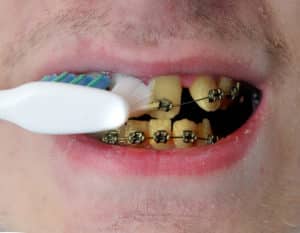The Causes of Bad Breath – and What You Can Do About Them
We all get bad breath from time to time – none of us can escape it. The thought of getting close to someone only to have them recoil from your breath is embarrassing at the least. When children have bad breath, it can subject them to humiliation at the hands of their peers, and cause them unnecessary emotional trauma.
Foods can temporarily cause bad breath, but this resolves as soon as the odor-causing food leaves your child’s system. Onions and garlic are common causes of bad breath, but within a day the problem will disappear.
There are many other causes of bad breath – some temporary and benign – and some more serious. Here are some of the more common causes:
Dental Hygiene
When a parent comes to us with the news that their child has bad breath, the first thing we look at is that child’s daily brushing and flossing habits.
Failing to brush effectively after meals or floss daily can leave food particles in your mouth, which cause bacteria to grow. Your mouth, after all, is the perfect Petrie dish – it’s warm and moist and receives food regularly. Bacteria will grow on your tongue, between teeth and your gums. A common ‘forgotten’ area is the tongue. Bacteria hide there between the taste buds and can cause very bad breath.

Often, all we need to do is give your child a ‘reminder’ on the proper way to brush and floss and the problem is solved. For younger children, we recommend lots of parental supervision, combined with our brushing and flossing charts available here. We can help them learn how to care for their whole mouth – including brushing the sides and top of their tongue. For adolescents and teens, reminding them to make healthy snack choices can also go a long way toward keeping those bacteria to a minimum.
Of course, orthodontics requires even more judicious cleaning – braces add surfaces to which bacteria can cling.
Smoking and Chewing Tobacco
We certainly hope that none of our teenage patients will take up smoking. The effect on their oral health can be profoundly negative and lifelong. (For the facts about smoking and your oral health, click here ). If they do, however, they can be guaranteed that they’ll have bad breath. Often, the thought of having bad breath is enough to make them not start smoking or chewing tobacco in the first place.
Smoking leaves a film on teeth and gums. It is one of the leading causes of early gum disease, which in turn adds to the bacterial load in the mouth.
Dental Caries
The bacteria Streptococcus mutans is responsible for dental caries (cavities). These bacteria loves sugar and gleefully multiplies when there is ample ‘food’. As S. mutans breaks down sugar, it creates acid, which in turn eats through enamel, causing decay. Decay just smells bad.
Obviously, good oral health habits and regular dental visits will help your child avoid the decay that damages teeth and gums and in turn causes bad breath. If you suspect your child has a cavity, a quick exam will help us determine the best course of action. Sometimes, we can even stop cavities without having to drill, click here to read how.
Gum Disease
Gingivitis, the precursor to periodontal disease, can be characterized by puffy, swollen and red gums that may bleed easily when your child brushes or flosses. At the first sign of any of these symptoms, it’s important to visit your Pediatric Dentist. When left untreated, periodontal disease will become a serious problem, resulting in tooth loss.
Children with Gingivitis often have bad breath because of the bacteria that are proliferating just below the gum line, between teeth or on the tongue.

Systemic Disease
Although in our Pediatric dental practice we don’t see a lot of serious diseases, children can still have systemic problems that cause bad breath. Sometimes, after we rule out other causes, such as poor hygiene, it’s a signal for that child to see his Pediatrician.
A few of the diseases which cause bad breath are chronic sinus infections, postnasal drip, diabetes, bronchitis, Sjogren’s syndrome, and liver or kidney disease. In these cases, it’s a good thing that bad breath is a symptom – it may be the only indication early on that there’s a problem.
Common in children can be inflammation or infection of Tonsils and/or Adenoids. The continual collection and retention of bacteria in the throat can create bad breath. If we don’t find issues of poor hygiene or dental caries, and your child suffers from frequent sore throats, it’s good to consult with a Pediatrician.
Chronic Dry Mouth
Having the medical condition ‘dry mouth’ (called Xerostomia) causes bad breath. Saliva, which is made up of mostly water, is necessary to help neutralize acids produced by plaque and wash away dead cells and bacteria that accumulates on the tongue and gums.
Sometimes dry mouth can be caused by a sinus issue, which creates the necessity for one to breathe through the mouth. Salivary gland problems can also occur, where the body doesn’t create adequate saliva.
Many medications cause chronic dry mouth. If your child is taking a medication and suffering this side-effect, there are rinses which can help. Sometimes even decongestants and antihistamines taken during a cold can dry the mouth sufficiently to cause bad breath, though this typically resolves as soon as the medications are stopped.
It’s worth noting that while mouthwash can temporarily mask bad breath, alcohol-based products if used to excess, will cause dry mouth.
Treatment
Determining the best course of treatment can best be done by your child’s Pediatric Dentist. She’ll conduct an examination, talk with you and your child about the causes and solutions. In nearly all cases, bad breath in children can be resolved easily, by employing some changes in foods, routines, or habits.
Prevention
Of course, preventing the issues that cause bad breath is the ideal scenario. We are vigilant about teaching our young patients good oral care habits that will serve them well throughout their lives. Seeing a Pediatric Dentist regularly, beginning at about one year of age will help catch any problems early, while they are still very easy to treat. Developing trust with our patients enables us to ensure they have a beautiful smile and healthy teeth and gums for life.
Education – for our patients and their parents – is one of the most important things we do. We’re always happy to take the time to answer questions, explain procedures, or troubleshoot issues as they come up.













